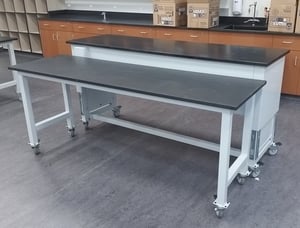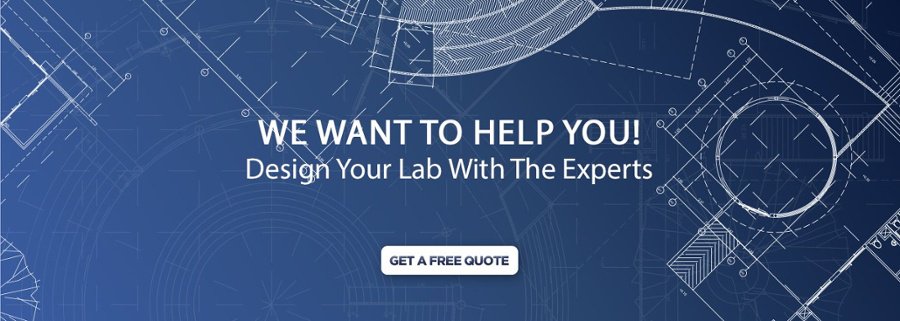When selecting heavy-duty work tables for commercial use, it can be tempting to focus solely on price and immediate availability.
However, these workhorses of the industrial and commercial worlds are central to productivity, safety and efficiency. Overlooking essential qualities can result in wasted resources, decreased employee morale, and even costly repairs or replacements.
Here are the key heavy duty work tables commercial qualities you should prioritize to ensure your heavy-duty work tables meet your business’s needs:
- Material durability and load capacity
- Surface design and finish
- Customizability
- Mobility and stability
- Compliance with industry standards
- Corrosion and chemical resistance
- Ease of assembly and maintenance
- Cost-efficiency over time
- Environmental sustainability
- Aesthetics and branding
Material Durability And Load Capacity
The materials used in the construction of heavy-duty work tables play a pivotal role in their longevity and performance. Steel and stainless steel are popular choices due to their strength, corrosion resistance and ability to withstand rigorous use.
Steel and stainless steel are popular choices due to their strength, corrosion resistance and ability to withstand rigorous use.
Phenolic resin and epoxy resin are excellent options for environments requiring chemical resistance, such as laboratories or industrial settings.
Check the table’s stated load capacity, and ensure it can handle the weight and type of equipment or materials your operations require. A table that cannot sustain the loads you’ll place on it is a liability, risking structural failure and workplace accidents.
Surface Design And Finish
Of particular importance when discussing materials is the surface design and finish you choose. The surface of the table should be suited to the tasks you’ll be performing. For example:
- Scratch-resistant finishes are crucial in environments where tools, machinery or abrasive materials are frequently used. Epoxy resin and phenolic resin surfaces excel in such conditions.
- Non-porous surfaces like stainless steel or phenolic resin are ideal for industries requiring sanitation, such as food preparation or healthcare.
- Anti-static (ESD laminate) surfaces are critical for electronics assembly to prevent damage to sensitive components.
Investing in a table with the right finish ensures durability, improves functionality and minimizes maintenance costs over time.
Customizability
Commercial work tables that allow for customization can better adapt to your specific operations. Adjustable height workstations accommodate different tasks or employees, ensuring ergonomic benefits and reducing the risk of repetitive strain injuries.
Modular designs that include options for shelving, drawers or tool holders can enhance organization and efficiency as well.
Mobility And Stability
Depending on your operational needs, mobility can be a significant factor. Mobile industrial workbenches equipped with heavy-duty casters allow you to easily move them within your facility, which is particularly valuable in dynamic work environments.
equipped with heavy-duty casters allow you to easily move them within your facility, which is particularly valuable in dynamic work environments.
Look for casters with locking mechanisms to ensure stability when the table is in use.
For stationary tables, stability is paramount. Reinforced legs and leveling feet can prevent wobbling on uneven floors, providing a safer and more reliable work surface.
Compliance With Industry Standards
Ensure the tables you choose meet relevant industry standards and certifications. For example, tables used in cleanroom environments should comply with ISO 14644 standards, while those in food-related industries should meet NSF certifications. Compliance ensures safety and can help your business meet regulatory requirements during inspections.
Corrosion And Chemical Resistance
In environments where exposure to chemicals, moisture or extreme temperatures is common, the table’s resistance to these elements is crucial. Stainless steel and phenolic resin tables are often favored for their ability to resist corrosion and harsh chemicals.
Epoxy resin surfaces are also highly resistant to a wide range of chemicals, making them suitable for laboratories and manufacturing settings.
Evaluate the chemical compatibility of your chosen material with the substances your table may encounter.
Ease Of Assembly And Maintenance
Work tables that are easy to assemble and maintain can save valuable time and resources. Look for designs with clear assembly instructions and minimal required tools. Tables with fewer joints or crevices—like those made of stainless steel or phenolic resin—are easier to clean, which is especially important in environments with stringent hygiene standards.
assembly instructions and minimal required tools. Tables with fewer joints or crevices—like those made of stainless steel or phenolic resin—are easier to clean, which is especially important in environments with stringent hygiene standards.
Regular maintenance, such as tightening bolts or applying protective coatings, can extend the life of your work tables. Choose models with accessible components to make upkeep as straightforward as possible.
Cost-Efficiency Over Time
While initial cost is an important consideration, it’s crucial to evaluate the long-term value of your investment. High-quality tables may come with a higher upfront price tag, but their durability and performance can reduce replacement and repair costs.
Ergonomic and customizable tables can improve worker productivity and reduce workplace injuries, offering indirect cost savings.
Environmental Sustainability
If sustainability is a priority for your business, look for tables made from recycled or sustainable materials. Some manufacturers provide certifications indicating their commitment to environmentally friendly practices. Investing in durable tables also supports sustainability by reducing waste over time.
Aesthetics And Branding
Although functionality is the primary focus, aesthetics should not be entirely overlooked. Clean, professional-looking work tables can contribute to a more organized and appealing workspace, which can boost employee morale and impress visiting clients. Some manufacturers offer tables in custom colors or with options to display your company’s branding.
In the end, selecting the right heavy-duty work tables for your commercial needs requires balancing functionality, durability and cost-effectiveness.
Start by evaluating your specific requirements: What tasks will the tables support? What environmental conditions will they endure? How important are factors like mobility, adjustability, and compliance?
By taking the time to carefully assess these qualities, you’ll not only enhance the efficiency and safety of your operations but also ensure your investment delivers value for years to come. A heavy-duty work table is more than just a surface. It’s a cornerstone of productivity and professionalism in the workplace.


